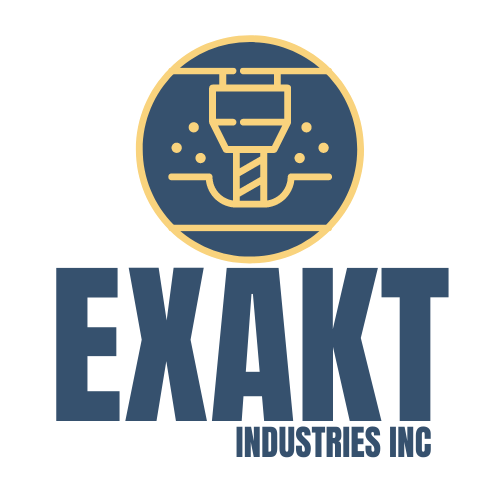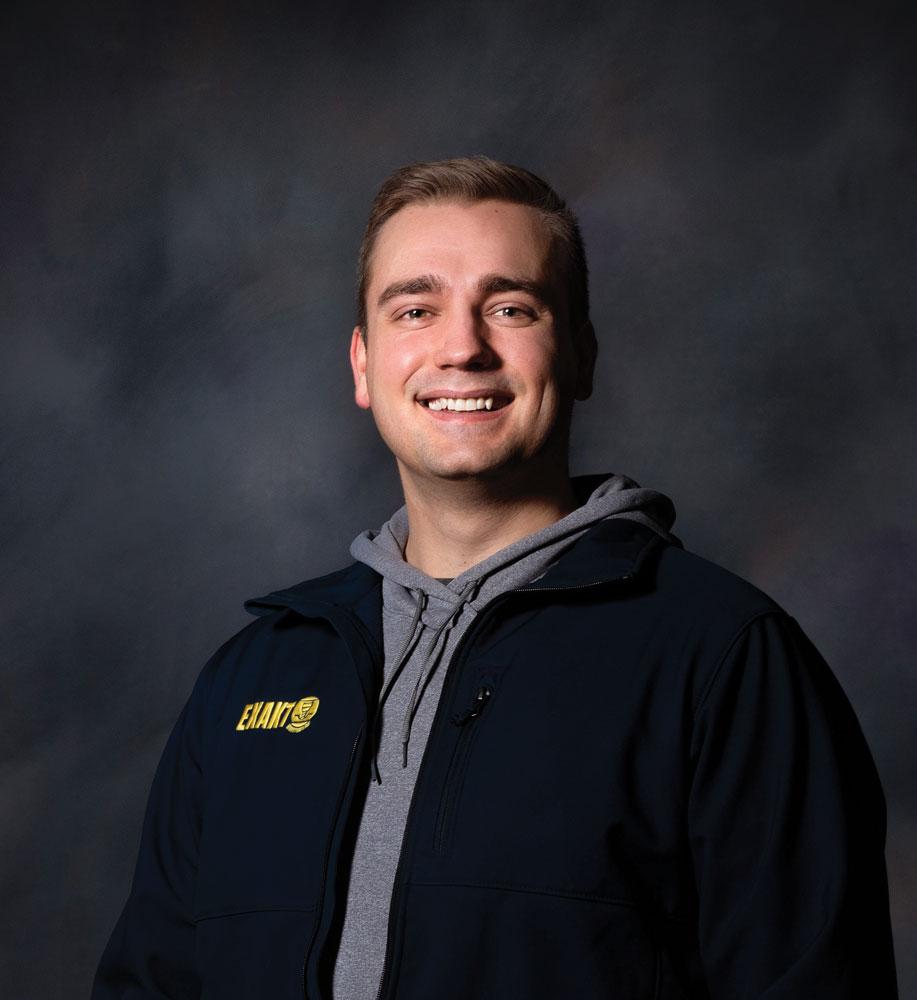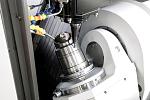Editor
- FMA
- The Fabricator
- FABTECH
- Canadian Metalworking
Profiles in manufacturing
Mike Oostenbrink, Exakt Industries
- By Joe Thompson
- December 22, 2022
- Article
- Metalworking
In the back of almost every machinist’s mind, a little flame of an idea burns: What if I had my own shop?
For Mike Oostenbrink, owner of Edmonton’s Exakt Industries, a combination of timing, circumstance, and a worldwide pandemic created what could be a once-in-a-lifetime opportunity to be his own boss.
“I think that a lot of machinists have aspirations of starting their own machine shop at some point in their life. The first moment I thought about starting my own machine shop was back when I was still an apprentice. I would chat about the idea with another co-worker all the time. It has always been in the back of my head ever since,” said Oostenbrink.
Oostenbrink started Exakt in the middle of the pandemic in the early months of 2021. At a time when supply chains were being interrupted, a local machine shop was the answer to some of the problems caused by COVID-19.
“Some people thought that I was crazy to try and start a company in the middle of a pandemic, but I was confident that I would make a go of it. I was able to secure some large contracts right near the beginning and the business took off immediately,” said Oostenbrink. “I think that the timing of everything was pretty lucky for me. Businesses were having a hard time bringing in machined components from overseas, so they were pivoting to local manufacturing while they waited for their sea-cans to make it over to North America.”
The Beginning
When Oostenbrik was finishing high school, he had no real ideas of where his early career would take him. During a break before starting his post-secondary education or workforce entry, his father recommended that he find work in a trade.
If, in fact, he decided not to go back to school for a degree, he would have a good start down the road to an apprenticeship. So, he took a job as a millwright helper at a company doing service work for oilfield equipment that had an in-house machine shop.
“At this point, I had no idea what a machinist did or that it was even a trade you could get into. We all hear about plumbers, electricians, mechanics, and framers, but this was the first time I had been exposed to machining and it really intrigued me,” he said. “I only spent a few months working with the millwrights before I decided to change gears and sign up as an apprentice machinist. I fell in love immediately.”
This is a common theme among those in the machining trade. Oostenbrink found that he enjoyed the challenges of working with different materials and thinking through the processing steps necessary to create a finished machined component.
He, of course, started where many in the trade start: turning the handwheels on manual equipment. Then came the jump to CNCs.

Oostenbrink started Exakt in the middle of the pandemic in the early months of 2021. At a time when supply chains were being interrupted, a local machine shop was the answer to some of the problems caused by COVID-19.
“The CNC side of machining was the most fun for me. I really enjoyed programming parts for production runs because you do most of the work upfront during the programming/setup and then let the machine do the rest of the work after,” he explained.
The First Gig
Shortly after finishing his apprenticeship, Oostenbrink took a job as a technical sales representative for tooling supplier Sandvik Coromant.
“Sandvik did a great job training their new sales reps in all things relating to cutting tools. I learned all about how to make parts in the most productive way possible, selecting the proper tools and inserts for the job, and how manufacturing really works on a large scale,” he said.
After several years working for Sandvik, he spent some time selling machine tools for DMG Mori. It helped lay the foundation for his future as a business owner and entrepreneur. So, as a ticketed machinist and with his new-found experience in processing parts efficiently, Oostenbrink found himself ready to be his own boss.
Enter Exakt
The name says it all. Exakt. It means the company machines parts correctly, on spec, and on time.
“There are parts that we manufacture where some of the features need to be very precise,” said Oostenbrink. “The tolerance that we have to machine the component to can be less than one-thousandth of an inch. To put that in perspective, most human hair is about that thick. If we are over or under the size by the width of a human hair, it would be considered out of tolerance and the part would be considered scrap.”
It may seem like 2021 is not that long ago, but in the day-to-day of a machine shop, a lot can change in that time. What has happened for Exakt in that timeframe is growth.
Oostenbrink started his company in a corner of a friend’s fab shop and thought he would be there by himself as owner/operator for at least a couple of years. But that was not to be the case.
“The company ended up growing much quicker than anticipated. We moved into our own space in February of this year, and I currently have four employees and I’m still looking for one more machinist,” he said.
The company’s revenue has tripled year-over-year and that doesn’t include the last few weeks of 2022.
And as for Oostenbrink the machinist? He spends more time as business owner these days.
“I actually don’t spend much time on the equipment anymore and I am focused on the development and growth of the business now,” he said. “This last year and a half has been a huge learning curve for me. It seems that every month there is a new challenge, but that is what keeps things so exciting.”
In the shop, Oostenbrink has pretty much stuck with the tools and technology that he was most familiar with. This meant purchasing GibbsCAM to program his parts and buying Haas machines because that’s what he had used in his early years as a machinist.
“It made it easy to get up and running without much of a learning curve. I am using almost exclusively Sandvik Coromant cutting tools because they are a high-performance tooling company that works with me to ensure the parts are being manufactured as fast as possible,” he said.
But life as an owner is different than life as a sales rep.
“I remember when I was working for Sandvik, customers would say that the price of our tools was higher than other competitors. We would explain that the cost of the consumables should only be 3 per cent to 6 per cent of the cost of the part, and I can now confirm that these percentages are accurate,” he said.
Oostenbrink believes that a shop’s main focus should be on reducing cycle times and getting the product finished as fast as possible, not on saving a couple dollars on inserts.
“I believe this is one of the things that will keep us competitive in the market. We are able to manufacture these parts much faster, and as a result, we are able to be more competitive to our customers,” he said.
The People Problem
With the benefits that come with being a business owner also come the challenges, and in the Canadian manufacturing sector right now that means finding workers.
“The part that I struggle with is keeping up with the demand and finding skilled machinists,” said Oostenbrink. “Right now, we are very busy and offering only long lead times means that we might not get an order. In the future, as we can afford it, I will be looking for new technology to improve our production. This will mean looking at a lot of our components and seeing how we can automate some of the manufacturing processes.”
Like many shops, he said the goal is to bring automation into his shop that will allow him to run parts well into the evening and possibly overnight. This will help him provide reasonable lead times to his customers and reduce the need for operators.
Mainstream headlines may say that manufacturing is in decline, but as for Oostenbrink, he’s exactly where he wants to be.
Quick Question: The Labour Shortage
Canadian Metalworking: What is the manufacturing culture like in Alberta right now and how do education providers like NAIT and SAIT help prepare young people for the industry?
Oostenbrink: Right now in Edmonton, I think there is a lack of machinists. Alberta is known for its boom-and-bust periods because manufacturing relies heavily on the oil and gas sector here. I think a lot of machinists got tired of this cycle and moved on to different things. There are a lot of kids coming out of high school that don’t want to get into a trade anymore.
Places like NAIT and SAIT are helping by providing entry-level programs to students who want to explore what it might be like in a trade. I hired a student from NAIT at the beginning of this year who took a CNC tech course. The students spend 10 months in a classroom setting and two months interning at a local machine shop.
This is a bit different than an apprenticeship where you work for 10 months and then go to school for two months [during a four-year apprenticeship]. I hired the student after the two-month internship, and he has been doing really well here at Exakt.
Editor Joe Thompson can be reached at jthompson@canadianmetalworking.com.
Exakt Industries, www.exaktindustries.ca
About the Author

Joe Thompson
416-1154 Warden Avenue
Toronto, M1R 0A1 Canada
905-315-8226
Joe Thompson has been covering the Canadian manufacturing sector for more than two decades. He is responsible for the day-to-day editorial direction of the magazine, providing a uniquely Canadian look at the world of metal manufacturing.
An award-winning writer and graduate of the Sheridan College journalism program, he has published articles worldwide in a variety of industries, including manufacturing, pharmaceutical, medical, infrastructure, and entertainment.
subscribe now


Keep up to date with the latest news, events, and technology for all things metal from our pair of monthly magazines written specifically for Canadian manufacturers!
Start Your Free Subscription- Industry Events
Automate 2024
- May 6 - 9, 2024
- Chicago, IL
ANCA Open House
- May 7 - 8, 2024
- Wixom, MI
17th annual Joint Open House
- May 8 - 9, 2024
- Oakville and Mississauga, ON Canada
MME Saskatoon
- May 28, 2024
- Saskatoon, SK Canada
CME's Health & Safety Symposium for Manufacturers
- May 29, 2024
- Mississauga, ON Canada





















